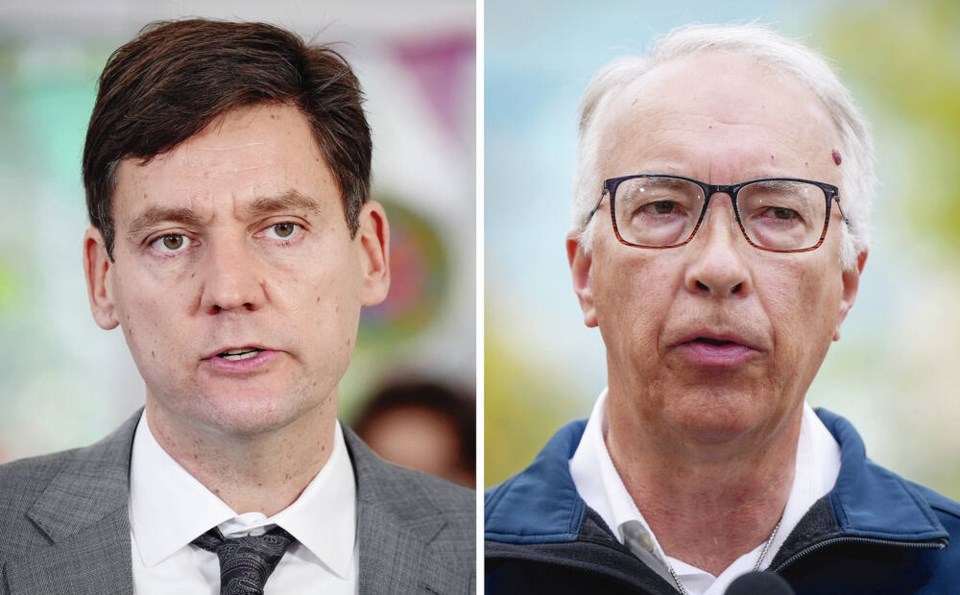B.C. Conservative Leader John Rustad fell back on the tried-and-true issue of crime and punishment Monday, with promises flowing from earlier success that opposition critics had in attacking the government on that front.
“Put criminals behind bars … crush organized crime and the drug crisis …. all out assault … we will not tolerate criminals terrorizing our communities …” the party declared Monday.
“Enough is enough,” said the statement, borrowing from the Save Our Streets citizens committee that was formed last year to advocate for more crackdowns.
One specific issue is the “catch and release” approach to criminal justice, a phrase heard repeatedly in the legislature after then-Opposition leader Kevin Falcon started flaying the NDP government with it.
Rustad’s platform includes a promise to toughen charge-assessment guidelines to “reverse the NDP policy that has allowed no-charge assessments to increase by 75 per cent.”
Those guidelines are for the B.C. Prosecution Service, which is independent-minded and takes direction from politicians only in specific circumstances.
Rustad said Conservatives will hire more sheriffs and judges to clear the massive court backlog. The NDP hiked the hiring of sheriffs earlier this year. There have been no reports yet of a drop in the backlog as a result.
Conservatives say they will fight for mandatory minimum sentences for violent offenders to ensure they serve real jail time. It’s phrased as “fight for,” as opposed to “impose,” because it’s entirely a federal responsibility.
There’s also a promise to create a new “statutory court” that will try minor criminal offences within one week of arrest, as opposed to the current 12- to 18-month time frames.
There is already a community court model that handles “minor” cases, mostly with a view to diverting offenders into help. The only way to try a case within a week of an arrest is to remove lawyers from the process.
Conservatives are also committing to making audio recordings of all court proceedings available online, as a way to improve accountability.
“Too many trials are functionally hidden from public view. … The system needs to be updated for the 21st century.”
(The B.C. Liberal government tried to televise trials of Stanley Cup rioters in 2011 but was rebuffed by a judge.)
Rustad on the weekend also promised to end tent cities “once and for all.” His plan involves supportive housing with zero tolerance for drugs or alcohol. They will only be built where the safety and character of communities can be protected.
“We will never force dangerous or disruptive facilities into neighbourhoods, as the NDP has done.”
He committed as well to “compassionate intervention” legislation, to allow for involuntary treatment for those most at risk.
Eby has made a long list of announcements on crime and public safety since he became premier 23 months ago. But he was goaded into many of them after the opposition started dwelling on public concern about street crime.
He initially tried to downplay it, relying on crime-rate statistics. But after B.C. mayors started demanding action, his government commissioned an independent report that confirmed most of their concerns about the justice system.
That moved him — after four years as attorney general — to recognize it as an issue. His first major announcement after being sworn in as premier was a big new law-and-order initiative, with funding for hundreds more police. The tone was not unlike Rustad’s this week.
It also included a directive to the prosecution service to oppose more bail requests. It was issued after months of dithering in the face of Opposition demands to do just that.
The overall law-and-order stance was politically notable because it contrasted with his pre-politics career as a civil liberties lawyer who was an ardent critic of police and author of the “How to Sue the Police” pamphlet.
Overall, the NDP and the Conservatives’ law-and-order stances are not as far apart as Rustad’s rhetoric suggests. That’s because Eby has been pressured into taking progressively tougher positions on the issues over the past few years.
As for showing results, it’s hard to demonstrate dramatic progress while coping with the never-ending opioid crisis. The NDP already knows that. It’s something a potential Conservative government would likely learn in short order.
>>> To comment on this article, write a letter to the editor: [email protected]



